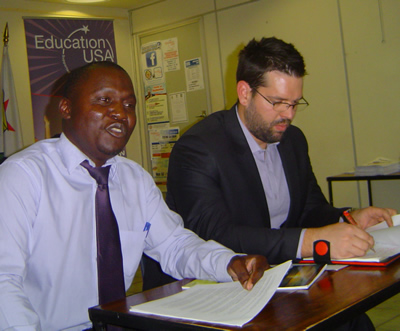Transitional Justice in Zimbabwe
Thursday, October 13th, 2011 by Varaidzo TagwireyiThe USA Embassy played host to a very lively discussion on Transitional Justice in Zimbabwe, based upon a national survey report compiled by the Zimbabwe Human Rights NGO Forum. Shastry Njeru, Manager of the Transitional Justice Section in this organization, presented the findings of the report. This presentation was facilitated by Leon Hartwell, a South African academic, passionate about African politics.
Transitional justice refers to legal or non-legal processes in which past violations are systematically addressed. It is a deliberate process of addressing the wrongs of the past. Though used synonymously with ‘national healing’, the term refers to a more definitive process, focusing more on righting past wrongs than on just forgiveness and getting over the past.
Njeru reiterated the need for the process to begin, expressing hope that the Organ on National Healing, Reconciliation and Integration, would come up with policy framework for management of a National Healing Process soon. Njeru believes Zimbabwe needs transitional justice because it has gone through several violent processes, namely,
Colonization
Liberation struggle
Post-independence disturbances & atrocities (Matabeleland & Midlands)
Other processes after the Unity Accord
Land reform
Murambatsvina
2008 elections
He feels that the ideal transitional justice model for Zimbabwe will draw from both western and traditional models, striking a context-driven balance, in order to achieve results that are legitimate to the citizens of this country
Njeru outlined countrywide outreach efforts of the Human Rights NGO Forum, from 2009 to date, including the Taking Transitional Justice to the People project, focused on seeking opinions of Zimbabweans and clearly showed that most Zimbabweans want restorative as opposed to retributive (revenge) resolutions. The Transitional Justice, National Survey continued on from this, and with the use of scientific research and selection tools 3189 randomly selected people were interviewed on what they thought was important for transitional justice.
Their findings
49% – effective healing can be achieved through compensation.
13% – perpetrators need to openly ask forgiveness.
Who’s responsible for compensation?
24% – individual perpetrators
(The majority of which have nothing themselves)
55% – Government
(Which essentially means the people of Zimbabwe, through taxes)
Who leads process?
60% – churches & government.
(But, which church(s)?
Organ on National Healing, Reconciliation and Integration the second, least-trusted to lead process.
(Due to lack of awareness?)
Which periods addressed?
41% – from 2000 onward.
18% – from just after Independence onward.
14% – from the Liberation Struggle onward.
1821
Below 45% – indifferent to questions.
(Due to fear and lack of awareness).
Recommendations for the way forward
Encourage awareness and further discourse through outreach programmes.
Use more victim-centered approaches in further programmes.
Organ on National Healing, Reconciliation and Integration needs to spread awareness and encourage discussions.
He concluded by saying that Zimbabweans would have to do the work by demanding more on the part of government, civil society and communities, to engage in the issue, and that if past issues are not addressed now, it will become more costly in the future.
Leon Hartwell’s comments
“A lot of people assume… that democratic elections in Zimbabwe will solve your problems… I don’t think that will happen. Looking at the past, if we don’t [properly] deal with transitional justice, violence will happen again.”
Hartwell believes that despite the nature and results of upcoming elections, unless something concrete happens, transitional justice will become meaningless and that Zimbabwe can no longer drag out the issue.
He naturally, drew parallels to South Africa’s TRC process, asking if it might be one way Zimbabwe can approach transitional justice. Although he stated that the TRC helped to bridge the transition process in SA, with over 21,000 people breaking the silence on apartheid, he admitted to its eventual failure. He said, even though it “did not get the complete truth…it [the process] gave a more complete picture of the truth”. South Africa still has a long way to go, and Hartwell said that the country has much to learn from Zimbabwe, and that his country is having discussions now, that Zimbabwe had in the 90s. He concluded by that the process will meet with resistance and it is important for civil society to keep the debate alive, in spite of it.










